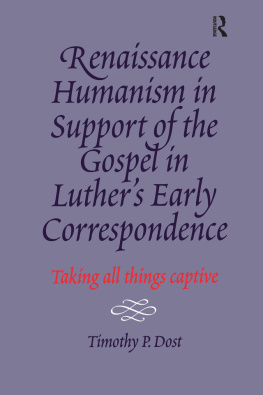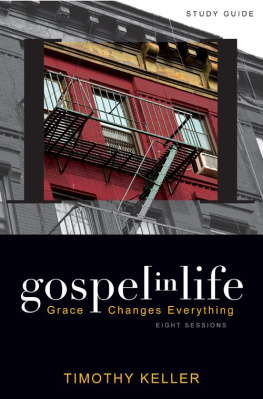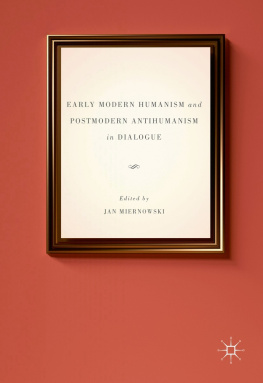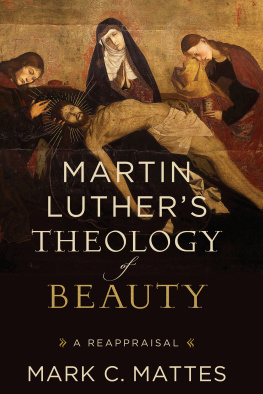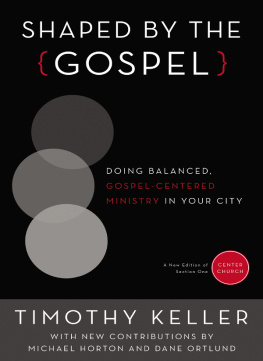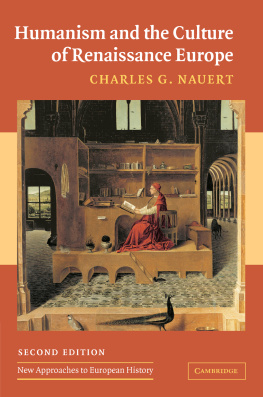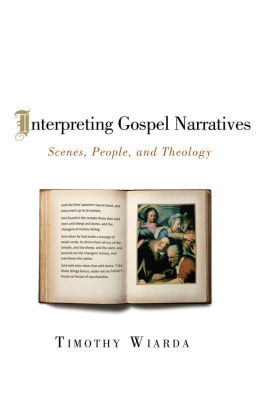Timothy P. Dost - Renaissance Humanism in Support of the Gospel in Luthers Early Correspondence
Here you can read online Timothy P. Dost - Renaissance Humanism in Support of the Gospel in Luthers Early Correspondence full text of the book (entire story) in english for free. Download pdf and epub, get meaning, cover and reviews about this ebook. year: 2017, publisher: Taylor & Francis, genre: Religion. Description of the work, (preface) as well as reviews are available. Best literature library LitArk.com created for fans of good reading and offers a wide selection of genres:
Romance novel
Science fiction
Adventure
Detective
Science
History
Home and family
Prose
Art
Politics
Computer
Non-fiction
Religion
Business
Children
Humor
Choose a favorite category and find really read worthwhile books. Enjoy immersion in the world of imagination, feel the emotions of the characters or learn something new for yourself, make an fascinating discovery.
- Book:Renaissance Humanism in Support of the Gospel in Luthers Early Correspondence
- Author:
- Publisher:Taylor & Francis
- Genre:
- Year:2017
- Rating:5 / 5
- Favourites:Add to favourites
- Your mark:
- 100
- 1
- 2
- 3
- 4
- 5
Renaissance Humanism in Support of the Gospel in Luthers Early Correspondence: summary, description and annotation
We offer to read an annotation, description, summary or preface (depends on what the author of the book "Renaissance Humanism in Support of the Gospel in Luthers Early Correspondence" wrote himself). If you haven't found the necessary information about the book — write in the comments, we will try to find it.
Timothy P. Dost: author's other books
Who wrote Renaissance Humanism in Support of the Gospel in Luthers Early Correspondence? Find out the surname, the name of the author of the book and a list of all author's works by series.
Renaissance Humanism in Support of the Gospel in Luthers Early Correspondence — read online for free the complete book (whole text) full work
Below is the text of the book, divided by pages. System saving the place of the last page read, allows you to conveniently read the book "Renaissance Humanism in Support of the Gospel in Luthers Early Correspondence" online for free, without having to search again every time where you left off. Put a bookmark, and you can go to the page where you finished reading at any time.
Font size:
Interval:
Bookmark:

2 Park Square, Milton Park, Abingdon, Oxon, OX14 4RN
711 Third Avenue, New York, NY 10017, USA
Product or corporate names may be trademarks or registered trademarks, and are used only for identification and explanation without intent to infringe.
Renaissance Humanism in Support of the Gospel in Luther's Early Correspondence:
Taking all things captive. Dost, Timothy Paul
1. Luther, Martin, 1483-1546 2. Humanism I. Title
144
Dost, Timothy P.
Renaissance Humanism in Support of the Gospel in Luther's Early Correspondence:
Taking all things captive / Timothy Paul Dost.
p. cm.
Includes bibliographic references and index.
ISBN 0-7546-0350-4 (alk. paper)
1. Luther, Martin, 1483-1546. 2. Humanism I. Title
BR333.5.H.85 D67 2001
284.1'092-dc21
2001022181
- Br. Briefwechsel
- LW Luther's Works, American Edition
- NIV The Holy Bible, New International Version
- NASB New American Standard Bible
- OER Oxford Encyclopedia of the Reformation
- RH Renaissance Humanism: Foundations, Forms, and Legacy
- WA D. Martin Luthers Werke: Kritische Gesamtausgabe, Weimar
Structure and Context: The Problem of Luther, the Correspondence, Humanism and the Gospel
Font size:
Interval:
Bookmark:
Similar books «Renaissance Humanism in Support of the Gospel in Luthers Early Correspondence»
Look at similar books to Renaissance Humanism in Support of the Gospel in Luthers Early Correspondence. We have selected literature similar in name and meaning in the hope of providing readers with more options to find new, interesting, not yet read works.
Discussion, reviews of the book Renaissance Humanism in Support of the Gospel in Luthers Early Correspondence and just readers' own opinions. Leave your comments, write what you think about the work, its meaning or the main characters. Specify what exactly you liked and what you didn't like, and why you think so.

